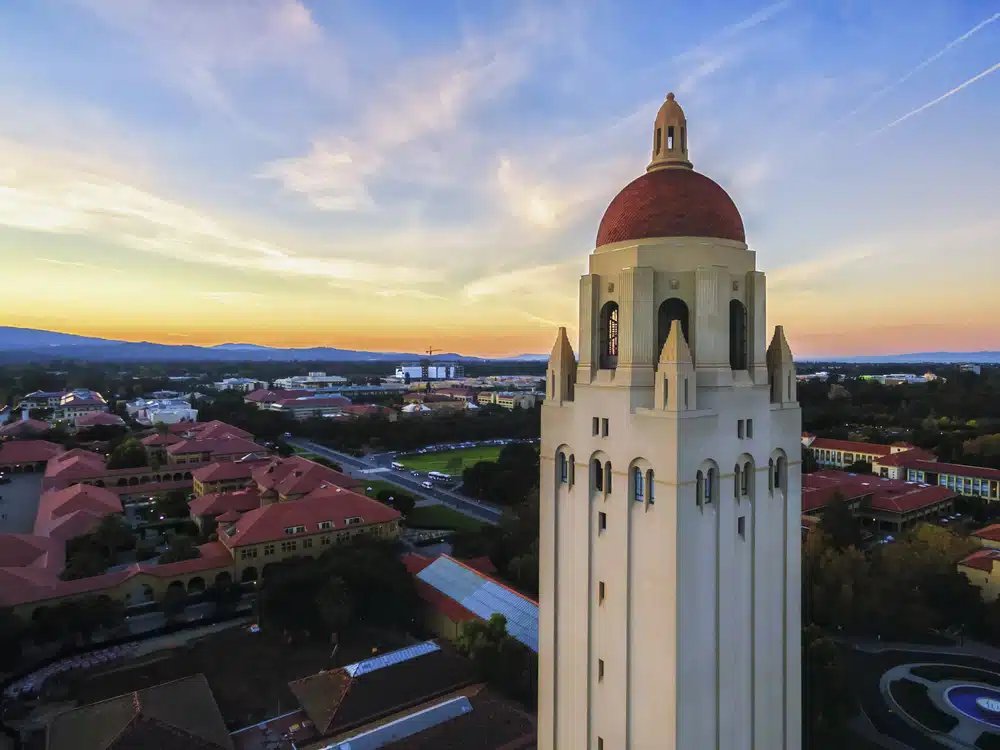Stanford Pre-Collegiate Summer Institutes
Are you a high school student with dreams of stepping onto your dream college campus? Are you eager to enhance your academic skills, explore new subjects, and get a taste of college life before taking the plunge? If the answer is yes, you’re in the right place.
In this blog, we’ll be diving into a valuable opportunity that can significantly boost your college application and prepare you for the journey ahead. Say hello to Stanford Pre-Collegiate Summer Institutes—a program designed to help you not only reach for your dreams but also grasp them firmly.
Join us as we uncover what these institutes have to offer and how they can set you on the path to your dream college acceptance. It’s time to turn aspirations into achievements. Let’s get started!
What Is The Stanford Pre-Collegiate Summer Institutes?
The Stanford Pre-Collegiate Summer Institutes is a program offered by Stanford University, designed to cater to academically talented and motivated high school students. The program provides a unique opportunity for these students to experience college-level coursework and explore a wide range of academic disciplines. While participating in the program, students engage in a variety of activities that are both academically enriching and personally rewarding.
One of the central components of the program is the opportunity to enroll in college-level courses across different subjects. These courses are taught by Stanford professors and instructors who are experts in their respective fields. The coursework is designed to be challenging, allowing students to delve deeply into their chosen subjects, engage in critical thinking, and participate in discussions and projects related to their studies.
Students also have the option to explore various aspects of college life by staying on the Stanford University campus during the program’s duration. This residential experience provides a taste of dormitory life and allows students to immerse themselves in the campus culture. It’s an opportunity for personal growth and independence, as students navigate campus facilities, including libraries, recreational areas, and dining halls.
In addition to academic coursework, the program often includes workshops and seminars on a wide range of topics. These may cover study skills, college admissions guidance, and career exploration, providing valuable insights for students preparing for their future academic and career paths.
Furthermore, some programs within the Stanford Pre-Collegiate Summer Institutes offer research opportunities. Students may have the chance to work on research projects under the guidance of faculty members, gaining hands-on experience in their chosen fields.
The program’s offerings also extend to single-subject study, which comprises a selection of 60 online courses. These courses allow students to focus on a specific area of interest, diving deep into their chosen subject matter and further enhancing their academic skills.
As part of the program, students often participate in social and cultural activities that help them connect with their peers and experience the rich cultural diversity of the Stanford community. Field trips, excursions, leadership workshops, and community service projects are also commonly integrated into the program, contributing to students’ personal development and providing opportunities for networking and forming valuable connections.
Single Subject Study: Online Summer Courses
Select from a diverse range of online summer courses that offer thorough and interactive exploration of academic content. These courses are not graded and do not confer academic credits upon completion. You can find courses covering various subjects such as computer science, mathematics, creative writing, social justice, philosophy, engineering, and many others.
The Online Courses Scheduled for 2024
1. Innovation and Entrepreneurship
SESSION ONE
June 17, 2024 – June 28, 2024
SESSION TWO
July 08, 2024 – July 19, 2024
GRADE(S)
9-11 at the time of application
2. Game Design for Good
SESSION TWO
July 08, 2024 – July 19, 2024
GRADE(S)
10-11 at the time of application
3. Game Design
SESSION ONE
June 17, 2024 – June 29, 2024
GRADE(S)
8-11 at the time of application
4. Design Your Life with Philosophy
SESSION ONE
June 17, 2024 – June 28, 2024
GRADE(S)
8-11 at the time of application
5. Discrete Mathematics
SESSION ONE
June 17, 2024 – June 28, 2024
SESSION TWO
July 08, 2024 – July 19, 2024
GRADE(S)
9-11 at the time of application
6. Artificial Intelligence
SESSION ONE
June 17, 2024 – June 28, 2024
SESSION TWO
July 08, 2024 – July 19, 2024
GRADE(S)
10-11 at the time of application
7. Environmental Solutions
SESSION TWO
July 08, 2024 – July 19, 2024
GRADE(S)
8-11 at the time of application
8. Equity in Medicine
SESSION TWO
July 08, 2024 – July 19, 2024
GRADE(S)
9-11 at the time of application
9. Frontiers in Physics
SESSION ONE
June 17, 2024 – June 28, 2024
SESSION TWO
July 08, 2024 – July 19, 2024
GRADE(S)
10-11 at the time of application
10. Product Design
SESSION ONE
June 17, 2024 – June 28, 2024
SESSION TWO
July 08, 2024 – July 19, 2024
GRADE(S)
8-11 at the time of application
11. Strategic Marketing
SESSION ONE
June 17, 2024 – June 28, 2024
GRADE(S)
9-11 at the time of application
12. The Nature of Evil
SESSION ONE
June 17, 2024 – June 28, 2024
GRADE(S)
9-11 at the time of application
13. Number Theory
SESSION ONE
June 17, 2024 – June 28, 2024
SESSION TWO
July 08, 2024 – July 19, 2024
GRADE(S)
9-11 at the time of application
14. Introduction to Data Science
SESSION ONE
June 17, 2024 – June 28, 2024
SESSION TWO
July 08, 2024 – July 19, 2024
GRADE(S)
9-11 at the time of application
15. Linear Algebra with Proofs
SESSION ONE
June 17, 2024 – June 28, 2024
SESSION TWO
July 08, 2024 – July 19, 2024
GRADE(S)
10-11 at the time of application
16. Art, Design, and Technology
SESSION ONE
June 17, 2024 – June 28, 2024
SESSION TWO
July 08, 2024 – July 19, 2024
GRADE(S)
9-11 at the time of application
17. Creative Writing: Poetry, Fiction and Nonfiction
SESSION ONE
June 17, 2024 – June 28, 2024
SESSION TWO
July 08, 2024 – July 19, 2024
GRADE(S)
8-11 at the time of application
18. Creative Writing: Poetry of Place
SESSION ONE
June 17, 2024 – June 28, 2024
GRADE(S)
8-11 at the time of application
19. Philosophy of Artificial Intelligence
SESSION TWO
July 08, 2024 – July 19, 2024
GRADE(S)
9-11 at the time of application
20. Investigations in Genetics
SESSION ONE
June 17, 2024 – June 28, 2024
GRADE(S)
10-11 at the time of application
21. Surgical Technology, Innovation and Entrepreneurship
SESSION ONE
June 17, 2024 – June 28, 2024
GRADE(S)
9-11 at the time of application
22. Sociology of Inequality
SESSION ONE
June 17, 2024 – June 28, 2024
GRADE(S)
8-11 at the time of application
23. Logic and Problem Solving
SESSION TWO
July 08, 2024 – July 19, 2024
GRADE(S)
8-11 at the time of application
24. Introduction to C++
SESSION ONE
June 17, 2024 – June 28, 2024
SESSION TWO
July 08, 2024 – July 19, 2024
GRADE(S)
8-11 at the time of application
25. Introduction to Human-Computer Interaction (HCI)
SESSION ONE
June 17, 2024 – June 28, 2024
GRADE(S)
9-11 at the time of application
26. Introduction to Machine Learning
SESSION ONE
June 17, 2024 – June 28, 2024
SESSION TWO
July 08, 2024 – July 19, 2024
GRADE(S)
10-11 at the time of application
27. Organizational Leadership
SESSION ONE
June 17, 2024 – June 28, 2024
SESSION TWO
July 08, 2024 – July 19, 2024
GRADE(S)
9-11 at the time of application
28. Topics in Bioscience
SESSION ONE
June 17, 2024 – June 28, 2024
SESSION TWO
July 08, 2024 – July 19, 2024
GRADE(S)
8-11 at the time of application
29. Topics in Neuroengineering
SESSION ONE
June 17, 2024 – June 28, 2024
SESSION TWO
July 08, 2024 – July 19, 2024
GRADE(S)
10-11 at the time of application
30. The History of Activism
SESSION TWO
July 08, 2024 – July 19, 2024
GRADE(S)
8-11 at the time of application
31. The History of Science
SESSION ONE
June 17, 2024 – June 28, 2024
GRADE(S)
8-11 at the time of application
32. Legal Studies: Critical Thinking Tools
SESSION ONE
June 17, 2024 – June 28, 2024
SESSION TWO
July 08, 2024 – July 19, 2024
GRADE(S)
9-11 at the time of application
33. Introduction to Ethnic Studies
SESSION TWO
July 08, 2024 – July 19, 2024
GRADE(S)
8-11 at the time of application
34. The Fundamentals of Augmented Reality (AR)
SESSION ONE
June 17, 2024 – June 28, 2024
GRADE(S)
9-11 at the time of application
35. Introduction to Engineering
SESSION ONE
June 17, 2024 – June 28, 2024
July 08, 2024 – July 19, 2024
GRADE(S)
8-10 at the time of application
36. Introduction to Structural Engineering
SESSION ONE
June 17, 2024 – June 28, 2024
SESSION TWO
July 08, 2024 – July 19, 2024
GRADE(S)
9-11 at the time of application
37. Principles of Macroeconomics
SESSION ONE
June 17, 2024 – June 28, 2024
SESSION TWO
July 08, 2024 – July 19, 2024
GRADE(S)
9-11 at the time of application
38. Introduction to Foreign Policy
SESSION ONE
June 17, 2024 – June 28, 2024
GRADE(S)
9-11 at the time of application
39. Chemical and Environmental Engineering
SESSION ONE
June 17, 2024 – June 28, 2024
SESSION TWO
July 08, 2024 – July 19, 2024
GRADE(S)
9-11 at the time of application
40. Topics in Psychology
SESSION TWO
July 08, 2024 – July 19, 2024
GRADE(S)
9-11 at the time of application
41. Media and Politics
SESSION ONE
June 17, 2024 – June 28, 2024
GRADE(S)
10-11 at the time of application
42. Biomedical Engineering
SESSION ONE
June 17, 2024 – June 28, 2024
SESSION TWO
July 08, 2024 – July 19, 2024
GRADE(S)
9-11 at the time of application
43. Business Strategy
SESSION ONE
June 17, 2024 – June 28, 2024
SESSION TWO
July 08, 2024 – July 19, 2024
GRADE(S)
9-11 at the time of application
Curriculum Overview
At the Stanford Pre-Collegiate Summer Institutes, you have the opportunity to immerse yourself in an academic experience unlike any other. This program offers intensive study in a single subject, allowing you to dive deep into areas that might not be covered in your regular high school curriculum.
You can choose from over 60 online courses, each designed to provide an in-depth exploration of a particular subject. These subjects range widely, encompassing areas like computer science, math, creative writing, social justice, philosophy, and engineering. The course content is not typical of high school material, offering you a chance to challenge yourself with advanced concepts and ideas.
The courses are not just lectures; they are interactive and designed to encourage your active participation. These courses are created and taught by instructors who are not only experts in their fields but are also passionate about teaching. This means that you’re not just learning advanced content; you’re also experiencing different teaching styles and methodologies that can broaden your understanding of the subject matter.
Another unique aspect of the Stanford Pre-Collegiate Summer Institutes is the global classroom experience. You’ll study alongside bright peers from around the world, sharing ideas and perspectives that can significantly enrich your learning experience. This international aspect also helps you build a network of friends and contacts from different cultures and backgrounds.
The courses are conducted live online, allowing for real-time interactions. With small class sizes, these live sessions are more than just lectures; they’re interactive discussions where you can engage directly with instructors and classmates. This setup ensures that you’re not just a passive listener but an active participant in your education.
The program is designed for enrichment rather than credit. This means that while you won’t earn academic credits, you are free from the pressures of grades and assessments. This approach allows you to focus on learning for the sake of learning, exploring subjects you’re passionate about without the added stress of grades.
The courses offered are diverse, providing you with an array of choices to match your interests. Whether you’re interested in biomedical engineering, philosophy, discrete mathematics, or any other field, the program offers courses that can cater to your academic interests. These courses are not just theoretical; they include hands-on experiences that can give you a taste of real-world applications of the concepts you learn.
Why You Should Participate
Participating in the Stanford Pre-Collegiate Summer Institutes can be a transformative experience for several reasons:
1. Academic Enrichment: You’ll have the opportunity to learn about subjects that may not be available in your regular school curriculum. The institutes offer courses in a variety of fields, including computer science, mathematics, creative writing, social justice, philosophy, and engineering. This allows you to explore new academic areas or deepen your understanding of subjects you’re already passionate about. Engaging in these advanced topics can enhance your critical thinking and problem-solving skills, which are invaluable for your future academic and career endeavors.
2. Exposure to College-Level Education: The program gives you a taste of what college-level education is like, preparing you for the academic rigor and learning style of higher education. The courses are designed and taught by knowledgeable instructors who are experts in their fields. This exposure to college-style teaching and learning can give you a significant advantage when you transition to university life.
3. Building a Global Network: You’ll be studying alongside bright and motivated students from around the world. This not only gives you a chance to make friends with diverse backgrounds but also to build a global network. Learning in such a diverse environment encourages cultural exchange and broadens your perspective, which is increasingly important in our globalized world.
4. Personal Growth and Development: Beyond academics, the institutes focus on promoting personal growth. You’ll participate in student life workshops and activities that cover topics like health and wellness, leadership, life and career planning, design thinking, and cross-cultural communication. These experiences contribute to your all-around development, helping you become a well-rounded individual.
5. Certificate and Evaluation: Upon completion of the course, you’ll receive a Certificate of Completion and a qualitative written evaluation from your instructor. These can be valuable additions to your academic portfolio, especially when applying to colleges or for scholarships. They serve as a testament to your dedication to learning and your ability to succeed in challenging academic environments.
6. Experience Stanford’s Campus Virtually: The program offers a unique opportunity to experience Stanford’s culture of innovation and academic excellence. Even though the courses are online, the program strives to incorporate the spirit and values of Stanford, which can be inspiring and motivating.
Faculty and Staff Excellence
As a participant in the Stanford Pre-Collegiate Summer Institutes, you will have the privilege of being taught by a diverse group of instructors who are not only deeply knowledgeable in their fields but also passionate about teaching. The faculty and staff are a vital part of what makes the program both unique and enriching.
The courses at Stanford Pre-Collegiate Summer Institutes are designed, created, and taught by instructors who are experts in their respective fields. These instructors bring a wealth of experience and knowledge, ensuring that the courses are both challenging and enlightening. You will be exposed to advanced content that goes beyond the high school curriculum, providing you with a taste of the Stanford classroom experience.
The program boasts small class sizes, which allows for a highly interactive learning environment. This setting enables real-time discussions where instructors and students can see, hear, and interact with one another. As a student, your engagement in every aspect of the course is encouraged, enhancing your learning experience and allowing you to benefit from the expertise of the instructors.
Stanford’s pre-collegiate summer programs are known for their multidisciplinary approach. Instructors often integrate various disciplines into their teaching, reflecting the diverse academic strengths of Stanford University. For example, in the arts courses, the connection between art and other academic fields, such as science, is emphasized, demonstrating how different disciplines can complement and enrich each other.
In programs like the Summer Humanities Institute and the Summer Arts Institute, instructors from Stanford’s own faculty and doctoral students lead small seminars. These courses delve into subjects like history, literature, philosophy, art, and science, encouraging students to engage with complex ideas and questions that have intrigued thinkers for centuries. For instance, in humanities courses, students explore topics like racial identity in American history and read philosophical novels to understand societal tensions. The arts courses, on the other hand, focus on the interdisciplinary nature of the arts at Stanford, showing how arts are connected to other fields.
The goal of these programs is not just knowledge acquisition but also skill-building. The instructors guide you in developing skills such as critical thinking, creative problem-solving, and effective communication. This holistic approach to education is designed to foster creativity and collaboration both inside and outside of the classroom, preparing you for future academic and personal pursuits.
Beyond the classroom, the residential staff, consisting of members from the Stanford community and other top universities, play a significant role in creating an unforgettable summer experience. They are not just facilitators but also mentors who support your academic and personal growth throughout the program.
Stanford Pre-Collegiate Summer Institutes’ Eligibility Criteria
1. Age Requirements: For the Stanford Pre-Collegiate Summer Institutes, you must be a current sophomore, junior, or senior at the time of application. Additionally, you need to be at least 16 years old by the start of the program and no more than 19 years old by its conclusion. These age limits are strictly adhered to, ensuring that all participants are within a similar developmental and academic range.
2. Academic Performance: Your academic record remains a crucial aspect of your eligibility. The program seeks students who have demonstrated high academic achievement and a passion for learning. This means your grades, as well as your intellectual curiosity and dedication to your studies, play a significant role in your application.
3. English Proficiency: As before, proficiency in English is essential. If you’re a non-native speaker, you need to provide evidence of your English fluency. This could be through standardized test scores or a teacher’s statement. Effective communication skills are vital for you to fully engage with the program.
4. Interest in Specific Subjects: Your interest in the specific subject area of the program you wish to join is important. The program values students who show a deep enthusiasm and eagerness to explore their chosen subject, demonstrated through school work, extracurricular activities, or personal projects.
5. Commitment to Full Participation: The expectation for full participation in both academic and extracurricular activities remains the same. You should be ready to actively engage in classes, discussions, assignments, and group projects, embracing the comprehensive learning experience.
6. Application Requirements: The application process includes submitting your academic records, work samples, and an optional video essay. The application fee is $65, with fee waivers available under certain conditions. For those seeking financial assistance, there’s a provision for financial aid based on demonstrated need. Ensure all parts of your application, including these materials, are submitted by the deadline to be considered for admission.
How Hard Is It to Join the Program?
Gaining admission to the Stanford Pre-Collegiate Summer Institutes can be competitive, primarily due to the program’s high reputation and the limited number of spots available. The program seeks intellectually curious and academically motivated students, and the selection process is designed to identify individuals who not only demonstrate strong academic capabilities but also a genuine passion for learning and exploration in their chosen field of study.
The application process itself is holistic, meaning that the admissions committee looks at various aspects of each applicant. This includes academic records, the quality of the work samples submitted, the optional video essay, and any other supporting materials that showcase the applicant’s abilities, interests, and suitability for the program. Because of this comprehensive approach, the admissions process can be quite rigorous.
The competitiveness also varies based on the number of applicants each year and the specific courses students apply for, as some courses may be more sought after than others. Additionally, the program’s global appeal means that you’ll be competing with students from around the world, further intensifying the competition.
How to Join the Stanford Pre-Collegiate Summer Institutes
Understanding the application process for the Stanford Pre-Collegiate Summer Institutes is crucial for your successful entry. Here’s a detailed breakdown:
1. Starting the Application: The first step is creating an application account on the Stanford Pre-Collegiate Summer Institutes’ official website. Use your legal name for the account, but you can use a parent’s email address to receive communications. This account is your gateway to the application process. It’s important to start early, as this gives you ample time to gather and prepare all necessary documents. Ensure you’re familiar with all the sections of the application so you can adequately prepare for each part.
2. Completing the Application Form: The online application form is your chance to showcase your academic and personal achievements. You’ll need to fill in your basic information, educational background, and details about your interests and extracurricular activities. Be honest and thorough in your responses. This form is a significant part of your application, as it gives the admissions committee a comprehensive view of who you are.
3. Academic Records Submission: You’re required to submit unofficial transcripts for each school or academic program where you earned grades from Fall 2021 through Fall 2023. If you’re homeschooled, submit a document similar to a transcript. These records provide the admissions team with a clear picture of your academic history and achievements.
4. Work Sample(s): You must submit at least one sample of your schoolwork, possibly two, depending on the courses you’re interested in. These samples should be recent (no older than two years) and demonstrate your best effort. If possible, include graded work and the prompt or directions. This is your opportunity to showcase your academic skills and talents.
5. Optional Video Essay: The video essay is an optional but highly recommended part of the application. It’s your chance to speak directly to the admissions committee and share more about your interest in the program. If your primary language of instruction is not English, it’s strongly encouraged to complete this part. The video essay adds a personal touch to your application, allowing the committee to see your enthusiasm and hear your reasons for wanting to join the program.
6. Application Fee and Financial Aid: There’s a $65 application fee, which you can pay online. Fee waivers are available under certain conditions. If you need financial assistance, you should apply for financial aid. The aid is based on demonstrated need, and both partial and full awards are available. Remember to submit the financial aid application by the designated deadline, usually a week after the admissions application deadline.
Throughout the application process for the Stanford Pre-Collegiate Summer Institutes, it’s important to stay organized and attentive to details. Check deadlines carefully, prepare your documents well in advance, and give yourself enough time to complete each step thoroughly.
When are the Application Deadlines for the Stanford Pre-Collegiate Summer Institutes?
The deadline to apply for the Stanford Pre-Collegiate Summer Institutes for the year 2024 is March 29, 2024. This deadline marks the final opportunity for students currently in grades 8–11 to submit their applications for this esteemed program. The institutes offer a range of courses that span various subjects, such as computer science, mathematics, creative writing, and more, providing an enriching experience for academically motivated students.
When applying, it’s important for you to gather and prepare all necessary documentation before the deadline. The application process includes submitting academic records, work samples, and optionally, a video essay. These materials are crucial in showcasing your academic abilities and interests. Additionally, there’s a $65 application fee, and provisions for financial aid are available for those who qualify and demonstrate financial need. The decision on your application will be released in mid-May 2024. Given the competitive nature of the program, it’s advisable to apply well before the deadline to ensure that your application is comprehensive and reflects your best effort.
Interactive Learning Environment of the Stanford Pre-Collegiate Summer Institutes
The Stanford Pre-Collegiate Summer Institutes offer an interactive learning environment that stands out for its depth, diversity, and the unique opportunities it provides. As a student here, you immerse yourself in an enriching educational setting that extends far beyond the conventional classroom experience.
The program allows you to choose from a wide array of subjects, including computer science, mathematics, creative writing, social justice, philosophy, and engineering. Each course is carefully designed to provide an in-depth and interactive exploration of the subject matter. These courses go beyond what is typically taught in high school, offering you an opportunity to delve deeper into topics of your interest.
A unique aspect of the program is its small class sizes. This feature enables more meaningful interactions between you and your instructors, as well as among your peers. You will be part of a global classroom, learning alongside students from around the world. This international environment not only enriches the learning experience but also fosters a broader understanding of different cultures and perspectives.
Courses are conducted live online, allowing for real-time, dynamic interactions. This format ensures that you are not just passively receiving information but actively engaging with it. The discussions are designed to be interactive, encouraging you to participate, ask questions, and share your thoughts. This approach helps to cultivate a deeper understanding of the subject matter and develops critical thinking skills.
The courses are led by instructors who are not only experts in their fields but are also passionate about teaching. This combination of expertise and enthusiasm for education makes for an enriching academic experience. The instructors bring their knowledge and real-world experiences to the classroom, offering insights that can inspire and challenge you.
The program is designed to be holistic, integrating both academics and social activities. This balance ensures that while you are challenged intellectually, you also have opportunities to interact with your peers outside of the academic setting. These interactions can lead to lasting friendships and a network of like-minded individuals who share your academic interests and curiosities.
Many of the courses offer hands-on experiences, allowing you to apply the concepts you learn in practical settings. This approach not only enhances your understanding of the subject but also gives you a glimpse into how these concepts are applied in real-world scenarios.
Extracurricular Activities and Campus Life at Stanford
At the Stanford Pre-Collegiate Summer Institutes, your experience extends beyond the academic rigor of the classroom. The program offers a range of extracurricular activities and a taste of campus life, ensuring a well-rounded and enriching summer experience.
The program’s structure emphasizes not just intensive study in your chosen subject but also a holistic approach to learning. This includes various student life workshops, group projects, and community events. These activities are designed to complement the academic side of the program and provide you with a balanced experience.
One of the key features of the program is its global focus. You’ll have the opportunity to interact and form connections with bright peers from around the world. This diverse environment fosters a sense of global community and broadens your perspective, allowing you to learn not only from the course material but also from the experiences and views of students from different cultural backgrounds.
Participation in these activities is crucial as they are integral to the program. They are designed to ensure that you are fully involved and benefit from both the academic and social aspects of the program. This balance is important in developing not just your intellectual capabilities but also your social skills, teamwork, and cultural awareness.
Moreover, the program’s extracurricular activities are tailored to provide real connections and practical experiences. Whether it’s through collaborative projects or engaging workshops, you’ll get the chance to apply what you learn in class to real-world scenarios. This approach enhances your learning experience, making it more dynamic and applicable to everyday life.
In essence, the Stanford Pre-Collegiate Summer Institutes offer a comprehensive experience that combines rigorous academic study with a vibrant array of extracurricular activities. This blend ensures that your summer is not only academically enriching but also personally rewarding, providing opportunities for growth, learning, and the creation of lasting memories and friendships.
Benefits of Early College Exposure
Early college exposure, as experienced through programs like the Stanford Pre-Collegiate Summer Institutes, offers several significant benefits that can positively impact your academic journey and future career prospects.
1. Enhanced Academic Performance: Research indicates that students participating in early college programs generally perform better in their studies. Early college students often outperform their peers in traditional high schools in areas such as state assessments in English and mathematics. This enhanced performance is attributed to the rigorous and advanced nature of the coursework in these programs, which prepares you well for the challenges of college-level studies.
2. Increased College Credit Accumulation: One of the most tangible benefits of early college programs is the opportunity to earn college credits while still in high school. On average, students in such programs earn a significant number of college credits, which can accelerate your academic progress once you start college. This head start can lead to earlier graduation and reduced college expenses.
3. Higher Rates of College Enrollment and Completion: Students who participate in early college programs are more likely to enroll in and complete postsecondary education. These programs instill a college-going mindset, making the transition to college smoother and more successful. The structure and support provided in early college programs help students become comfortable navigating the college system and getting involved in campus life.
4. Long-term Financial Benefits: Although early college programs may cost slightly more than traditional high school education, the long-term financial benefits are significant. The investment in these programs pays off in terms of increased lifetime earnings for students. By facilitating higher educational attainment, early college programs contribute to increased earnings over a career, higher tax contributions, and reduced dependence on government assistance.
5. Equal Benefits Across Student Demographics: Early college programs benefit students across different demographics, including gender, race/ethnicity, and family income. This equitable impact makes these programs particularly valuable in addressing educational disparities and ensuring that all students have access to advanced academic opportunities.
Networking Opportunities at the Stanford Pre-Collegiate Summer Institutes
Participating in the Stanford Pre-Collegiate Summer Institutes offers a range of benefits, but it’s important to understand its impact on college admissions, particularly for students aiming for highly selective institutions like Stanford University.
Attending the Stanford Pre-Collegiate Summer Institutes can be a valuable experience, enhancing your academic profile and demonstrating your commitment to learning. However, it’s crucial to recognize that participation in these programs does not guarantee admission to Stanford University or any other college. According to Stanford Summer Session’s website, Stanford does not consider “demonstrated interest” such as attending the Pre-Collegiate Summer Institute in making undergraduate admissions decisions.
While participation in the program might not directly increase your chances of admission to Stanford, it does provide a strong academic experience. You can showcase this experience in your college applications to indicate your academic engagement and seriousness about your studies. This is beneficial when applying to any college, not just Stanford. The program’s rigorous academic environment helps you develop skills and knowledge that are attractive to admissions committees.
One of the primary goals of the Pre-Collegiate Summer Institutes is to introduce you to university life. You’ll have the opportunity to experience college-level courses, interact with passionate instructors, and engage with peers from diverse backgrounds. This exposure can be invaluable in helping you decide on your future academic path and understanding what you want from a college experience.
Attending the Pre-Collegiate Summer Institutes can enhance your college application in several ways. It demonstrates your ability to handle college-level coursework and your willingness to challenge yourself academically. Additionally, the program can provide you with unique experiences and perspectives to share in your college essays and interviews.
It’s important to reiterate that attending the Stanford Pre-Collegiate Summer Institutes does not provide a direct advantage in Stanford’s undergraduate admissions process. The experience should be viewed as part of a broader set of academic and extracurricular activities that shape your college application. Your academic performance, standardized test scores, extracurricular involvement, essays, and letters of recommendation continue to play crucial roles in the admissions process.
If you decide to participate in the program, focus on gaining as much as you can from the experience. Excel in your classes, engage with your instructors, and actively participate in discussions and projects. These efforts can lead to a deeper understanding of your academic interests and potentially result in strong letters of recommendation. Remember, the most significant benefit of the program is the academic growth and personal development it fosters, which can be influential in your college application process and beyond.
The Program’s Impact on College Admissions
While participation in the program does not guarantee admission to Stanford or any other university, it can be a valuable part of your college application. It shows your willingness to engage in advanced academic work and demonstrates your intellectual curiosity. However, it’s important to remember that your overall application, including GPA, standardized test scores, and extracurricular activities, plays a significant role in college admissions.
One of the most significant benefits highlighted by participants is the chance to meet and interact with students from all over the world. This not only enhances the learning experience but also helps you build a global network of peers who share similar interests and ambitions.
Beyond the academic rigor, the program focuses on building skills and fostering creativity and collaboration. You’ll learn not just from instructors but also from your peers, enhancing both your academic and interpersonal skills. Past participants often highlight how the program has helped them grow as individuals and develop new skills that are useful in their future academic and professional endeavors.
The program’s goal is to introduce you to university life and give you a taste of the college experience. You’ll have the opportunity to take courses from college professors and experience what it’s like to be on a university campus, albeit virtually. This exposure can be invaluable in helping you decide your future academic path and understand what to expect from college life.
Final Thoughts
As you reach the end of this blog, you now have a clearer picture of how the Stanford Pre-Collegiate Summer Institutes can be a pivotal stepping stone toward achieving your college dreams. This opportunity offers you a chance to immerse yourself in a challenging academic environment, connect with like-minded peers, and demonstrate your commitment to learning and growth.
By participating in this program, you’ll not only expand your knowledge and skills but also gain a unique advantage in the competitive college admissions process. So, take the first step toward your future today. Explore the various courses, prepare your application, and envision the bright opportunities that await you.
Remember, your journey to your dream college is a step-by-step process, and the Stanford Pre-Collegiate Summer Institutes can be one of the most significant steps you’ll take. Embrace this opportunity, stay motivated, and keep striving for your goals. Your dream college is within reach, and with dedication and determination, you can make it a reality.
It is important to have all the necessary information before making any decision. AdmissionSight is always here to help you with any questions or concerns. We have over ten years of experience helping students successfully navigate the challenging admissions process.
Consult with AdmissionSight and find out how we can help you get into the school of your choice by ensuring that you are fully informed and prepared for the application process. We will work with you to develop a personalized plan that meets your specific needs and goals. We will also provide you with access to our team of experts who can help you with everything from choosing the right schools to writing your essays.
Don’t let the admissions process overwhelm you. Contact AdmissionSight today and let us help you achieve your dreams.












































